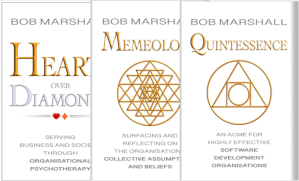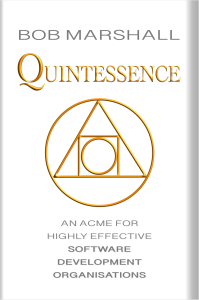In the Land of Morons, the one-brain-celled Man is a goat.
Monthly Archives: November 2021
Quickie: Better Managers or No Managers?
In a 2009 study, the Chartered Management Institute (CMI) came up with some interesting numbers.
CMI research found 68% of managers admitted to being ‘accidental managers’, not aspiring to a management career. It found 50% of staff thought they could do a better job of managing than their current line manager. An almost identical number (49%) said they would rather take a pay cut if it meant working with a better manager.
So, better managers (I find this unlikely) or no managers?
Tarred With the Brush of Excellence
Tarred With the Brush of Excellence
I note a widespread aversion to the idea of “doing things properly”. Not just in the software industry, but also in wider society.
I’m not going to define what “properly” for software development looks like – although I have done so at length in my latest book “Quintessence”.
It’s as if people associate excellence (doing things properly) with higher costs, more effort, and a likely higher boredom factor.
Whence these associations, I wonder? In my mind, doing things properly implies lower costs, less effort, and more joy in the doing. If not, then how could we describe it as “properly”?
How about you? What’s you take on folks’ responses to “excellence” and the idea of doing things properly?
– Bob
Further Reading
Peters, T.J. and Waterman, R.H. (1982). In Search of Excellence: Lessons from America’s Best-run Companies. Profile Books.
Marshall, R.W. (2021). Quintessence: An Acme for Software Development Organisations. Falling Blossoms (LeanPub).
ICYMI: Cost of Focus Revisited
In case you missed it:
Quickie: Truth
“Truth is what the voice within tells you.”
~ Mahatma Gandhi
Repost: Thou shalt care for thy customer!
WordPress suggested I read this post, and having done so, I’ve chosen to repost it here for your delectation:
Thou shalt care for thy customer!
Quickie: TIL Mob Etymology
Today I learned the etymology of the word “mob” – as in “Mob Programming”, a.k.a. Ensemble development. It’s a contraction derived (circa 1680) from the Latin phrase “mobile vulgus” meaning “the fickle crowd”.
See also: Ochlocracy, Programmer Anarchy.
Organisational Psychotherapy Bargain Book Bundle
Organisational Psychotherapy Bargain Book Bundle
You might like to know that a special bargain bundle of all three of my organisational psychotherapy books, Hearts over Diamonds, Memeology, and Quintessence, is now available on Leanpub at a special bargain price.
– Bob
ICYMI: What Is A Mindset?
In case you missed it:
Quickie: Agile in Essence
In essence, Agile is a set of assumptions and beliefs about how work should work. See the flaws?
Still Rejecting the Idea of the Collective Psyche?
Still Rejecting the Idea of the Collective Psyche?
“Cognition extends into the physical world and the brains of others.”
~ Aron Barbey, Richard Patterson & Steven Sloman
A new research paper suggests that efforts to understand human cognition should expand beyond the study of individual brains.
Regularly readers will know that Organisational Psychotherapy rests, in large part, on the idea of the collective consciousness a.k.a. organisational psyche.
Check out this new paper for some confirming research (not that evidence or science sways people).
“Cognition is, to a large extent, a group activity, not an individual one,”
~ Steven Sloman
– Bob
More #NoProjects
More #NoProjects
To think that most organisations and their managers still think in terms of projects!
Long time readers of this blog will know of my favour for #NoProjects. I recently came across this neat (free) mini-ebook on the subject: #NoProjects A Culture of Continuous Value from InfoQ.
Your view on projects vs NoProjects?
– Bob
A Plea For Connection
A Plea for Connection
I’ve not come across this article before, so having just read it – and been both comforted and enlightened – I thought I might share it with you:
– Bob
Quickie: As Popular as a Skunk at a Picnic
Inviting senior people – well, anyone, really – to examine their assumptions and beliefs makes one about as popular as Ignaz Semmelweis inviting doctors to wash their hands before touching their patients.
Fun Times at Familiar
Fun Times at Familiar
I’m minded to write something positive for a change (!) so I thought I might share how much fun a quintessential development organisation can be to work with. (I say work with, because we had almost no power structures, no managers, no bosses, and everyone was a colleague, a fellow.)
Familiar was a software house and consultancy, based near Reading UK (some forty miles west of London), which I started and led circa 1996-2000.
The years at Familiar was, for many of us, enormous fun. We were doing great things for our clients, bonding as a group, and learning loads about how to become a Quintessential organisation. The social side was just as much fun as the business side. Indistinguishable, really. We placed a lot of emphasis on the social aspects of the organisation:
- Company-funded weekends away in plush country hotels – for the folks in the company along with their significant others.
- Regular dIning out as a group, on the company’s expenses.
- Collaborative sessions (sprint planning and the like) in each others’ homes.
- Other group social events (e.g. exhibitions).
- An office configured for socialising – and learning – as much as for work (lounge, sofas, library, books, kitchen, etc.).
This was all made possible by the success we had commercially – a virtuous circle where fun led to great work for clients led to high margins led to funds for more fun…
It was the kind of win-win-win (clients, us, suppliers) that quintessential organisations regard as normal.
If you have any questions, I’d be happy to answer them.
– Bob
Quickie: The Great Resignation
Which is the greater, the Great Resignation or the Great Disengagement?
I suspect the latter.
Quickie: Quintessence Now 80% Complete
My latest book, “Quintessence” is now 80% complete and available on LeanPub. All the memes are now present, although a few remain incomplete, as yet. Is it now time to buy?
Why Read This Book?
Quintessence provides organisations with a blueprint of the collective assumptions and beliefs underlying the effectiveness of the quintessentially effective software development organisation.
Remember,
E = 𝑓(Mindset)
Organisational effectiveness is a function of the collective mindset of the organisation.
Who is responsible for the effectiveness of your organisation? And what exemplars do they have to work on that?
No Adaptation Required
No Adaptation Required
I’ve seen many folks suggest we adapt Crosby’s Four Absolutes of Quality to the software context. The arguments proffered smack of ignorance of what software development is about, or ignorance of Crosby’s work.
Crosby’s Four Absolutes of Quality
- Quality is defined as conformance to requirements.
- The system for causing quality is prevention, not appraisal.
- The performance standard must be Zero Defects.
- The measurement of quality is the Price of Non-conformance, not indices.
Well, maybe it’s not the profferers’ ignorance so much as their being blinded by their existing assumptions and beliefs.
In my latest book, Quintessence – An Acme for Highly Effective Software Development Organisations, I propose Four Absolutes of Quintessence:
- The definition of quintessence is meeting all needs of all the Folks That Matter™️.
- The system for moving towards quintessence is people choosing to change their collective assumptions and beliefs.
- The performance standard for quintessential organisations is zero needs of all the Folks That Matter going unmet, every time.
- The measurement of quintessence is the consequences of not meeting folks’ needs, sometime referred to as the cost of ineffectiveness, a.k.a. the Cost of Focus.
Whereas the above list – the Four Absolutes of Quintessence – differs from Crosby’s list, the former is about organisational effectiveness, the latter about quality. When talking about the quality of software, no adaptation from Crosby’s original list is required.
– Bob
Quickie: Bossing
Nonviolence is wildly unpopular in organisations of all stripes and sizes.
I wonder why?
Beyond the Software Teams
Beyond the Software Teams
One of the biggest constraints on the effectiveness of Agile software teams (the real ones, not the much more numerous pretend, faux-agile ones) is the assumption that the structures, assumptions and beliefs of the host organisation will not change. That it is, in fact, impossible to get these to change, or to expect them to change.
An assumption which becomes a self-fulfilling prophecy.
“Whether you think you can, or you think you can’t – you’re right.”
~ Henry Ford
When this assumption goes unexamined and unchallenged, adopting Agile ways of working within the software teams – or in any part of the organisation, in isolation – is a highway to hell.
– Bob
P.S. You might like to take a look at my latest book – Quintessence – to see how highly effective organisations approach and solve this challenge.
Further Reading
Marshall, R. W. (2021). Quintessence: An Acme for Highly effective Software Development Organisations. Falling Blossoms (LeanPub)


